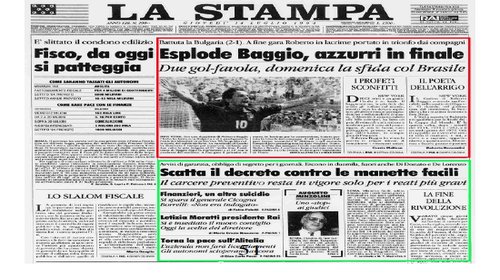
By Iacopo Tonini ’15, current student in the International Trade, Finance and Development program. Follow him on Twitter @iacopotoni
On April 8th Professor Ruben Durante (Sciences Po) visited the Institute of Political Economy and Governance (IPEG) to present his latest research paper, “Attack when the world is not watching? International Media and the Israeli-Palestinian conflict” (coauthored with Ekaterina Zhuravskaya, Paris School of Economics). The title clearly suggests that the article relates to the Israeli-Palestinian conflict, however the research aims at demonstrating a more general result. Indeed, the objective is establishing a causal relationship between unpopular policy choices and news with a “highly relevant” media content.
“I have noticed that my older daughter steals her brother’s toys when we (the parents) are not home”, the Italian professor stated cheerfully while explaining where he had initially gotten the idea for the research. The process seems to make sense. In the case of an influential conflict such as the Israeli-Palestinian one, it could well be the case that the factions involved wait for the world to look away before coordinating and ultimately launching a brutal offensive – or interrupting a ceasefire after a period of peace.
Beyond the intuitive example extrapolated from the professor’s family life, more concrete cases are the following. On the very same day in which the Italian National team qualified for the World Cup final (July 13, 1994), the Berlusconi government passed and approved an emergency decree – recently renamed the “save-the-thieves” decree– that allowed several politicians accused of corruption to avoid imprisonment, and keep working unscathed. Another example is the start of the Russian military operations to invade Georgia. The Russian army received the order to attack during the opening ceremony for the 2008 Beijing Summer Olympics. Finally, during the 2014 FIFA World Cup, while at the stadium Mineirão in Belo Horizonte the German national team was inflicting a historical débâcle to the Seleçao, Israel launched the operation “Protective Edge” against Gaza.

“Governments are accountable to the extent that the public is informed about their actions. Mass media ensure accountability by informing citizens about government actions (Besley and Prat, 2006; Snyder and Stromberg, 2010),” answered the professor to one of the questions asked by a scholar. “Yet, how effectively mass media inform the public depends, among other things, on the presence of other newsworthy events that may crowd out the news coverage of governments’ actions (Eisensee and Stromberg, 2007).” The assumption on which the study is built – and that the Israeli-Palestinian case seems to demonstrate – is that politicians might exploit the presence of other “newsworthy events” to put forward unpopular actions so that they coincide with major events that distract the audience.
However, could this perhaps be the overly-pessimistic vision of the researcher? The data shows otherwise. In particular, Professor Durante shows in his work that when the Israeli-Palestinian conflict is given coverage in the media, there is a 12% increase in the Google searches related to the topic.
Let us focus on the case studied in the paper: the Israeli-Palestinian conflict.
Since the 70s, the Israeli government has put a great effort in projecting a positive image of Israel and its army abroad. This policy is denominated Hasbara, which in Hebrew means “explanation”, and entails the production of informative material on issues regarding Israel and the Middle East. Furthermore, Hasbara includes collaborations between international and local journalists, and social-media usage to influence public opinion. Nothing similar is in place in Palestine.
In his article the Professor writes: “Most likely, in an armed conflict nothing has a worse impact on the international public opinion than civilian casualties.” The factions involved seem to be perfectly aware of the primary role mass media have in informing, and thus influencing, public opinion. Evidence of this is found, for instance, in the words of the Prime Minister Netanyahu who, when interviewed by the CNN about the numerous civilian victims, commented: “[Hamas] wants to pile up as many civilian dead as they can…they use telegenically dead Palestinians for their cause.”
By combining daily data on attacks on both sides of the conflict with data on the content of evening news for top U.S. TV networks, the authors show that: “Israeli attacks are more likely to be carried out when the U.S. news are expected to be dominated by important (non-Israel-related, such as an election or the Super Bowl) events on the following day.” Specifically, the empirical findings indicate that the strategic timing of the Israeli army is less relevant in a period of intense fighting as opposed to attacks in a period of relative peace. Moreover, the attacks are strategically planned only in the case when there is the possibility of civilian casualties. Thus, the facts documented in the paper confirm that the aim of Israel is that of “minimizing negative international publicity” – and in the case of graphic or emotional contents regarding civilian victims, would result in a strong, negative impact on the American public opinion.
In contrast, the researchers find “no evidence that attacks by Palestinian militant groups are timed to U.S. news pressure.” This might be reflecting the marked gap that exists between the two arrays: unlike Israel, Palestine does not have a structured or well-organized army, nor does it have the same level of resources that would allow it to plan such attacks strategically. Nevertheless, it should be noted that this does not exclude the possibility of Palestine’s lack of interest towards shaping American public opinion.
Beyond the interesting findings of the research on the role international media plays in the Israeli-Palestinian conflict, this study also reminds us of the powerful responsibility it holds. In particular, mass media is a watchdog powerful enough to influence the actions of governments by simply carrying out their mission of informing citizens. This becomes even more important when considering the exponential interconnectedness of people throughout the globe via technological progresses.
References
- Besley, Timothy and Andrea Prat, “Handcuffs for the Grabbing Hand? Media Capture and Political Accountability,” American Economic Review, 2006, 96 (3), 720–736.
- Eisensee, Thomas and David Stromberg, “News Droughts, News Floods, and U.S. Disaster Relief,” The Quarterly Journal of Economics, 05 2007, 122 (2), 693–728.
- Snyder, James M. and David Stromberg, “Press Coverage and Political Accountability,” Journal of Political Economy, 04 2010, 118 (2), 355-408.
